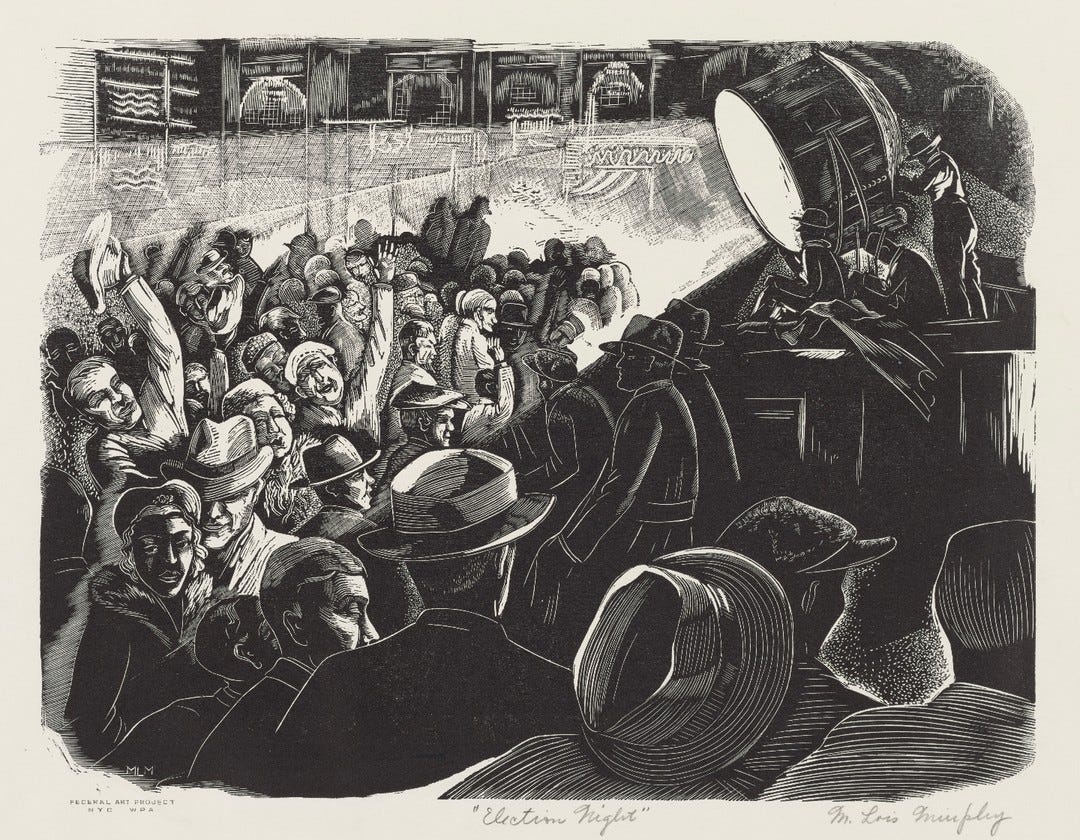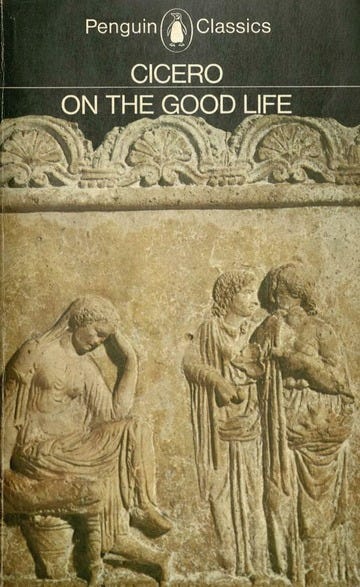The Polling Debate, cont'd; Opinions on Opinion; Indecorous Decorum; Boorstinism
Reading, Watching 08.24.25
This is a regular feature for paid subscribers wherein I write a little bit about what I’ve been reading and/or watching.
If you’re not yet a paid subscriber but regularly read, enjoy, or share Unpopular Front, please consider signing up. This newsletter is completely reader-supported and represents my primary source of income. At 5 dollars a month, it’s less than most things at Starbucks, and it’s still less than the “recession special” at Gray’s Papaya — $7.50 for two hot dogs and a drink.
You can buy When the Clock Broke, now in paperback and available wherever books are sold. If you live in the UK, it’s also available there.
Starting tomorrow, Monday, August 25th, Unpopular Front will be on vacation for two weeks. But have no fear: you’ll still be getting your newsletters; I’ve decided to repost some old essays on art, culture, and technology from the early days when I barely had any subscribers. I think they still hold up fairly well and perhaps have gained some additional salience since we are now living through the A.I. aesthetic apocalypse. I hope to weave them all together one day to form some kind of Big Theory of Culture, but we’ll see about that.

My take on polling, along with Eric Levitz's response in Vox and my response to his response, has sparked a little bit of debate about the uses and abuses of quantitative approaches in politics. In a recent Q&A newsletter, Matt Yglesias says that he’s “got sympathy for the anti-empiricist sentiments in Ganz’s original article,” but “[w]here I think he and frankly a lot of younger progressives go off-base is in actually misreading the history of polling and empiricism in Democratic Party politics.” And then he goes on to this whole anecdote about his time in Schumer’s office and how it used to be that the conventional wisdom was to always moderate because voters were thought of as generally conservative, and the data-based approach has actually complicated that story and found some issues that people are relatively progressive about. I’m sorry, but personal experience aside, I think he’s the one who’s got the history wrong. Go back a little farther, to the era that David Shor and the “popularists” are explicitly harkening back to: in the ’90s, Dick Morris pioneered micro-issue polling, which shaped the agenda of the Clinton Administration. Of course, Morris was also an extremely shrewd operator, and the Democrats won elections on his watch, but that also had to do with Clinton’s more intangible skills as a politician and his gift for rhetoric—the guy could really give a speech. So, I’ll just say in closing, if you’re gonna degrade public discourse and reduce politics to issue polling, at least win a goddamn election. This goes to my whole critique of the Democratic establishment: I’m open to the idea of “safety first, let’s moderate and win.” Okay, if it works, it works! But you can’t run on competence and common sense and then be incompetent and speak gibberish. An establishment that can’t continue to establish itself is useless.
I’ll share some of the background readings for the rhetorical, civic humanist model of politics.
First, the great essay “Truth and Politics” by Hannah Arendt on the conflict between those two things:
…[H]istorically the conflict between truth and politics arose out of two diametrically opposed ways of life – the life of the philosopher, as interpreted first by Parmenides and then by Plato, and the way of life of the citizen. To the citizens’ ever-changing opinions about human affairs, which themselves were in a state of constant flux, the philosopher opposed the truth about those things which in their very nature were everlasting and from which, therefore, principles could be derived to stabilize human affairs. Hence the opposite to truth was mere opinion, which was equated with illusion, and it was this degrading of opinion that gave the conflict its political poignancy; for opinion, and not truth, belongs among the indispensable prerequisites of all power. “All governments rest on opinion,” James Madison said, and not even the most autocratic ruler or tyrant could ever rise to power, let alone keep it, without the support of those who are like-minded. By the same token, every claim in the sphere of human affairs to an absolute truth, whose validity needs no support from the side of opinion, strikes at the very roots of all politics and all governments. This antagonism between truth and opinion was further elaborated by Plato (especially in the Gorgias) as the antagonism between communicating in the form of “dialogue,” which is the adequate speech for philosophical truth, and in the form of “rhetoric,” by which the demagogue, as we would say today, persuades the multitude.
….
….Lessing’s magnificent “Sage jeder, was ihm Wahrheit dünkt, und die Wahrheit selbst sei Gott empfohlen” (“Let each man say what he deems truth, and let truth itself be commended unto God”) would have plainly signified, Man is not capable of truth, all his truths, alas, are δόξαι, mere opinions, whereas for Lessing it meant, on the contrary, Let us thank God that we don’t know the truth. Even where the note of jubilation – the insight that for men, living in company, the inexhaustible richness of human discourse is infinitely more significant and meaningful than any One Truth could ever be – is absent, the awareness of the frailty of human reason has prevailed since the eighteenth century without giving rise to complaint or lamentation.
Cicero, in his On the Orator, says what I was trying to say in my “Against Polling” piece, except much more eloquently, of course. (Maybe that’s why I unconsciously used that painting of Cicero denouncing Catiline?) But he also points out why it’s so difficult to be a good rhetorician:
But the fact of the matter is that oratory is a much more considerable activity, and depends on a far wider range of different arts and branches of study, than people imagine. The trouble cannot be lack of incentive. A great number of persons want to learn how to speak; there are teachers in abundance; outstanding talent is available; the legal issues that come up display an infinite diversity; and the rewards, as I said, are truly splendid. In view of all these circumstances, there can only be one possible reason for the scarcity of speakers of any competence: the incredible vastness and difficulty of the subject.
For, first, one has to acquire knowledge about a formidable quantity of different matters. To hold forth without this information will just mean a silly flow of windy verbiage. And then one has to be able to choose one's words well, and arrange them cleverly. It is also essential to have an intimate understanding of every emotion which nature has given to mankind: it is in the processes of calming or exciting the feelings of an audience that both the theory and practice of oratory find their fullest expression. Other requirements include a certain sparkle and wit, and the culture appropriate to an educated man, and a terse promptitude both in repartee and in attack. A sensitive, civilized lightness of touch is also desirable. One's memory, too, must be capable of retaining a host of precedents, indeed the complete history of past times. Nor is it by any means advisable to be ignorant of the law and existing statutes.
….
I hold the view that no one can be the complete and perfect speaker unless he has learnt about all the important subjects and arts that exist. For he needs such a background in order to enrich what he says, and give it depth. Unless he has all this material at his disposal, thoroughly comprehended and absorbed, every word he utters will be vapid and childish. Certainly I will not burden orators with the demand that they should be omniscient; and least of all would I insist on such a thing from our own speakers here at Rome, who have to operate amid all the bustle of city life.


